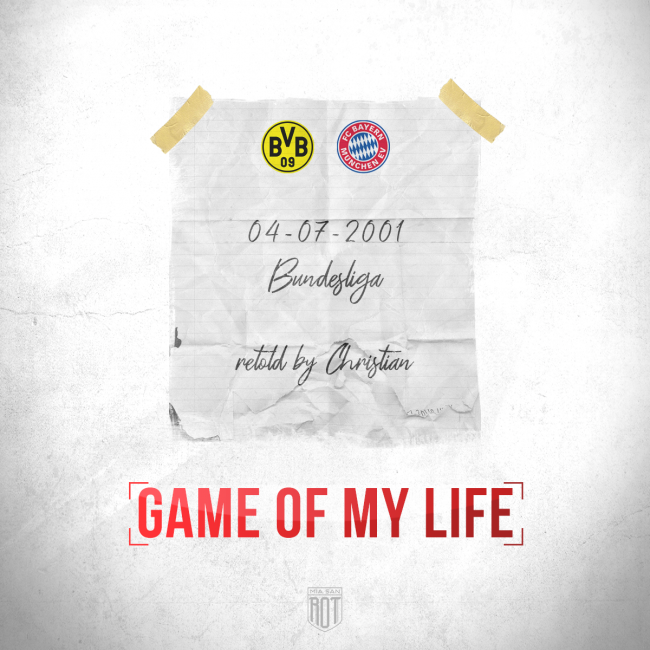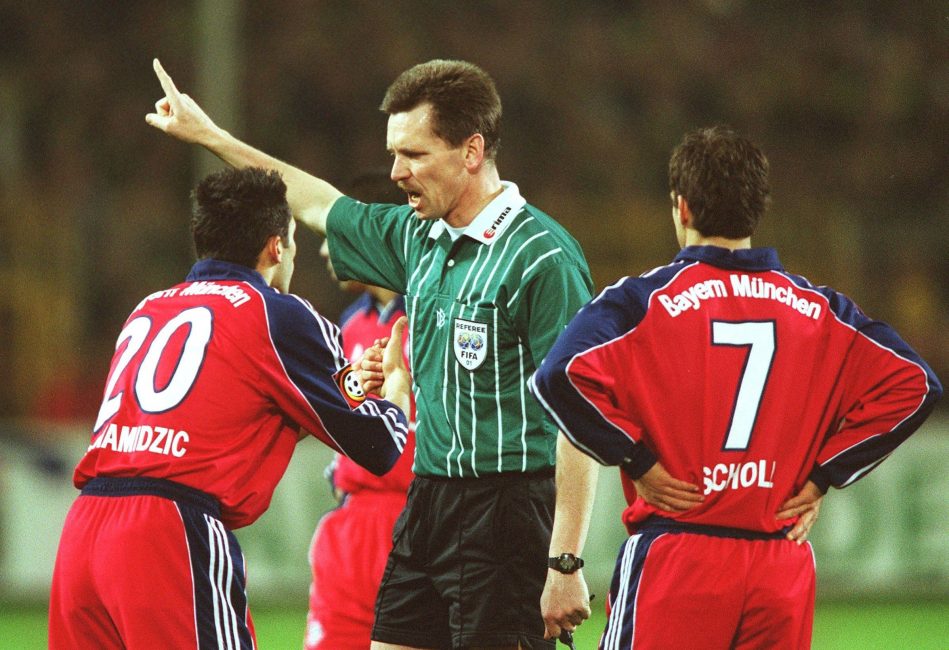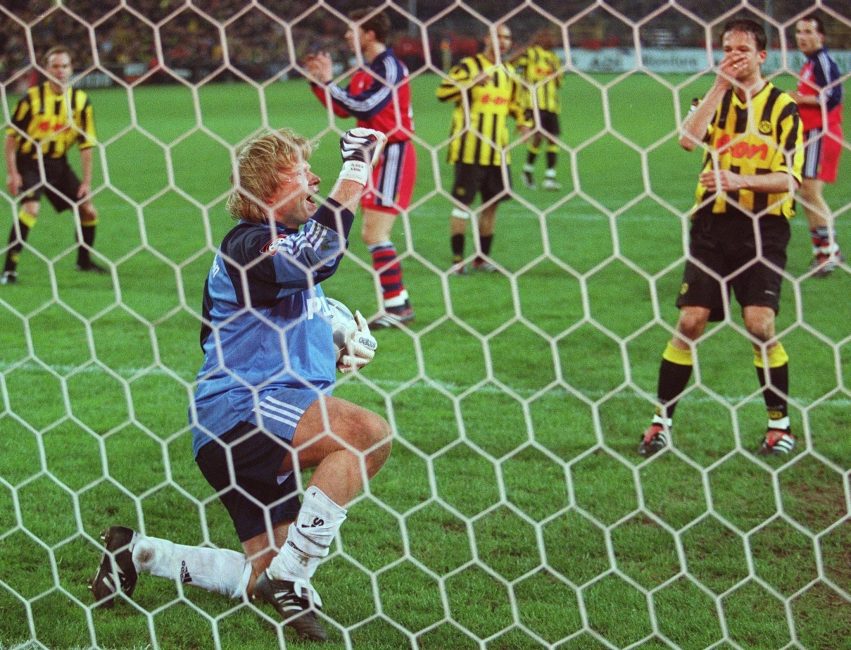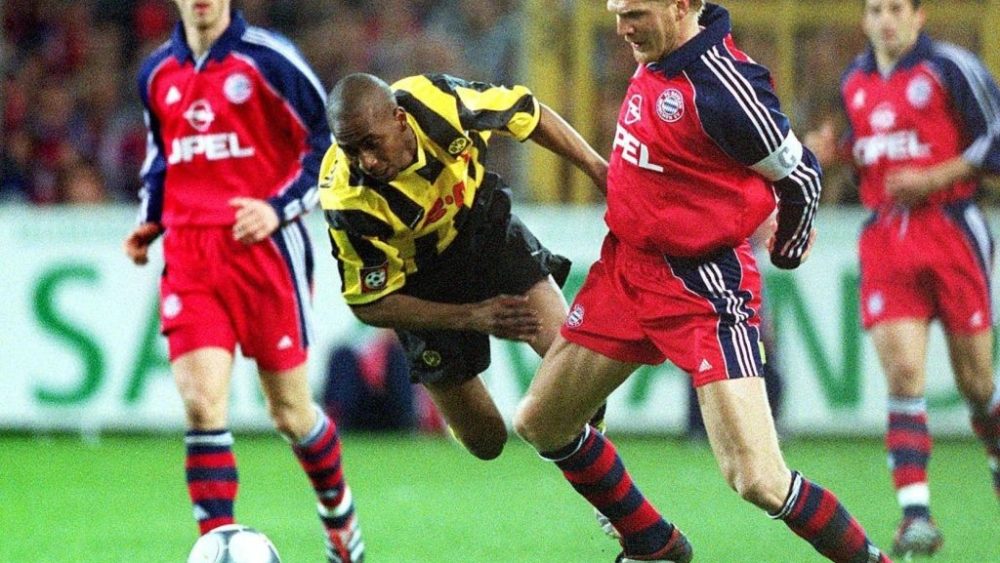Game Of My Life #04: Yellow then Red in Yellow and Red
The situation before the match
After 27 matchdays in the 2000/01 season, the tension in the Bundesliga was palpable. There were only three points separating first and sixth. A point behind league leaders FC Bayern lurked Borussia Dortmund. Behind them were Schalke, Leverkusen, Hertha BSC, and Kaiserslautern – all on 46 points.
Previously Bayern had deservedly lost 3-2 at home to Werder Bremen. Hitzfeld had rotated to keep some powder dry for the crucial quarter-final first leg of the Champions League. Away to 1999 final opponents Manchester United, the starting line-up included Andersson, Lizarazu, Salihamidžić, Scholl, and Jancker once more. With a strong defensive performance and opportunistic attacking jabs, Bayern made a huge step towards the semi-finals, thanks in large part to the outstanding holding midfielder Jens Jeremies alongside Stefan Effenberg. Another Champions League final, after the trauma of 1999, was possible.
With their chests out, Bayern travelled to their next top opposition in Borussia Dortmund. On the 7th April 2001, the title was at stake for both teams. Referee Hartmut Strampe anticipated adversity, because he “felt from the start that something wasn’t quite right with this game. You see players like Oliver Kahn, Stefan Effenberg or Jens Jeremies and you notice their tension and aggression.”

In case you missed it
The starting lineups
BVB coach Sammer could call on an experienced first eleven, except for the injured Jürgen Kohler. Ahead of Jens Lehmann, a back-three of Wörns, Metzelder, and Oliseh was strengthened situationally by Evanilson and Dede out wide. BVB’s engine room was made up of Lars Ricken and Tomas Rosicky, supported by Jörg Heinrich. Up front Otto Addo was tasked with opening up space for out-and-out striker Fredi Bobic.
Bayern coach Hitzfeld sprung a surprise with Roque Santa Cruz alongside Giovane Elber – Carsten Jancker took a seat on the bench after the match at Old Trafford, as did Paulo Sergio, who had scored the winning goal in Manchester. Other than those personnel changes, the back-four of Lizarazu, Linke, Andersson, and Kuffour was as expected for Bayern. The duo of Effenberg and Jeremies, in perfect harmony, started in front of the defense, supported by hard working Salihamidžić. Further forward, Mehmet Scholl had a free role and was tasked with supplying the strikers with passes.
The first half
The atmosphere in the Westfalenstadion was very heated from the word go. For minutes, every Bayern touch was greeted with a cacophony of whistles. I was directly behind the goal in the away end and could barely hear myself speak. The players on the pitch in front of me won’t have experienced it any differently. In this charged atmosphere, Elber and Lizarazu suddenly played a lovely one-two. Lizarazu dinked the ball over Evanilson and coolly played in Santa Cruz, who fired into the bottom right. Pandemonium in the away end and the first proper chants.
Urged forwards by the Dortmund fans, BVB tried to take the game into their hands. The tie was overwhelmingly contested in midfield, because both back-lines were attentive. The referee, Strampe, then showed the first two yellow cards to Bixente Lizarazu and Sammy Kuffour. It was the real start of a memorable afternoon. Both teams and also the referee increasingly lost control of the game. Otto Addo and Giovane Elber clashed – yellow for both. Soon after, Bixente Lizarazu got a second yellow – and a red card to go with it. The yellow card for briefly holding Rosicky was certainly correct by the letter of the law. However I did have the impression that with one final strict warning Strampe could have got an important player on his side and by doing so calmed the game down. On top of that, Lizarazu’s first yellow was a harsh decision. But the opposite happened. Before the break Strampe gave yellows to Oliseh and Linke too. In a game that was by now completely incoherent, Bayern managed to keep Dortmund away from their goal with 10 men. In spite of that, Bayern fans feared at the break that the team’s strength could dwindle after such a busy week. Despite leading at half-time, nobody really thought Bayern would win.

(Image: Bongarts/Getty Images)
The second half
There was a turbulent, even chaotic start to the second half: within minutes, Dortmund had the ball in the back of the net twice. Neither were given due to offside. The wrong decision for at least the first goal. But Dortmund didn’t take it lying down: Dede’s free-kick found Ricken on the right, who sent a cross right in front of goal, where Bobic reacted with more quickness of thought than Kuffour: 1-1. Bayern a man down and with still almost 40 minutes to play.
Right after the equalizer Salihamidžić saw yellow, and just a minute later there was what seemed to me like a light shoulder-barge from captain Effenberg. A yellow, okay, you’ve seen them given. But Strampe showed a straight red. Second sending off for Bayern.
1-1 x (9 vs 11): for Hitzfeld the mathematician, that calculation offered only one way out: play for time to salvage a draw with their backs to the wall. Sagnol on for Santa Cruz. Now the longest period of the game without cards began: for 20 minutes, Dortmund tried to take the lead, but nothing came off for them. Oli Kahn, despite his side being two men down, barely had anything to do. Once Oliseh struck the crossbar from distance, but other than that not much happened in footballing terms. Bayern, though, despite their two red cards, got involved in a bit of needle and gave away a few fouls, seeing three more yellows.
From a footballing point of view it was a miserable top-of-the-table clash, which was however incredibly tense because of the red cards, the balance of the game and the table situation. In the 90th minute Dortmund got one more free-kick in a promising position. Rosicky placed the ball, and I’ll never forget the atmosphere behind Oli Kahn’s goal: an infernal concert of whistles from the Bayern fans, with flares being lit. In a cloud of red fog, we fans and Oli Kahn were in a shared space, watching Rosicky’s free kick together as it flew, staring unbelievingly towards the unprotected corner of the goal. But the ball struck the inside of the post, bouncing directly across the goal line into the hands of Kahn. The titan fell to his knees, punching the air in celebration – and we fans embraced each other. We were certain: we wouldn’t lose this game and we would certainly win the title in 2001. Dortmund were frustrated, and Evanilson found time to get a red card in stoppage time after a brutal tackle.
Things I noticed
Normally here we write about football. Particular tactical observations or outstanding individual performances. But after this game in April 2001, nothing in a footballing sense was left over. The story was the referee, Strampe, and the cards. Two reds, a red for two yellows, and 11 yellow cards led to the fiercest, most-carded Bundesliga game of all time. A negative record that still stands 18 years later. Why did that clash escalate so much? What role did the referee play in it?
For Uli Hoeneß there was only one guilty party: “I’ve never seen a game in which the referee made so many mistakes from minute 1 to 95, at least 50!”
Strampe himself didn’t see that he had made “any massive mistakes”, but admittedly ruefully: “From a certain point I felt that the players weren’t reacting to the cards anymore. The only player I could speak to normally was Mehmet Scholl. The rest, I couldn’t get through to.”

(Image: Bongarts/Getty Images)
Oliver Kahn took the team out of the firing line for their excessive, unsporting way of playing: “It was a lot of fun today, better than when you have nothing to do! I think today was an advertisement for emotions, not football. Rosicky’s free-kick against the post was a sign that Dortmund didn’t deserve to win. We came from Manchester, they play international football there. Here the ref blew up for everything. It’s no wonder that Germany is losing its standing internationally!”
Dortmund’s Bobic criticised the referee too. BVB certainly got off lighter in the card storm than FCB, but felt disadvantaged due to the wrongly disallowed goal in the 47th minute: “I could say a lot more to the ref, really get stuck in, but then [referee chief] Amerell would fall off his chair!”
The dismissed Stefan Effenberg had a surprisingly fair reaction: “It was very hectic and there were lots of emotions in the match. It was clear that emotions were running high, the ref knew that too. He didn’t have it easy today. With my foul I wanted to block the ball, and then obviously the Brazilian took a nice fall!” Mehmet Scholl, who during the game had kept out of most of the rough and tumble, stood up for Strampe: “I don’t want any part in all the criticism here. Refs are just people too.”
In the stadium and in the days afterwards, as a Bayern fan I was obviously bothered about the flood of cards against our side. For me, Strampe had totally spoiled the game with his whistle. With a bit of distance, however, I have to admit that though Effenberg’s red was far too harsh, almost all the yellow cards were justified. Bayern had made life hard for themselves with moments of indiscipline like kicking the ball away, swarming the ref constantly, and excessive play.
Harmut Strampe, by the way, would never referee Bayern again, as Uli Hoeneß demanded after the game.
I haven’t just picked this game due to the historical card record. In my eyes it was the psychologically decisive match of the season which would culminate in the Champions League triumph in Milan and the last-second title in Hamburg. The team had gone through a battle, had defended first place in Dortmund with fight and fortune. Bayern were perhaps more occupied with the more physical side of the game, certainly not at their best in a footballing sense. But no team was a match for the tenacity and confidence of that legendary team.
18 years ago, Bayern’s football was completely different to the last ten years. It was less attractive, strategically it was inferior – but it was exciting and thrilling in a certain way. The battle in Dortmund, a real “clashico”, is a perfect example of this successful time in FC Bayern’s history.










